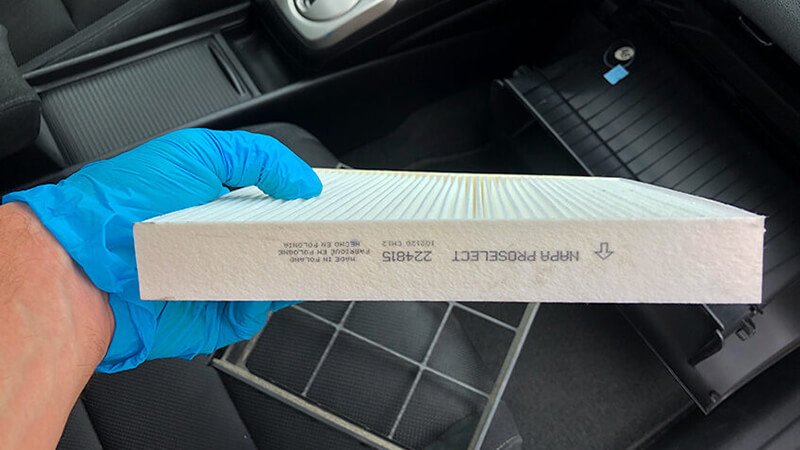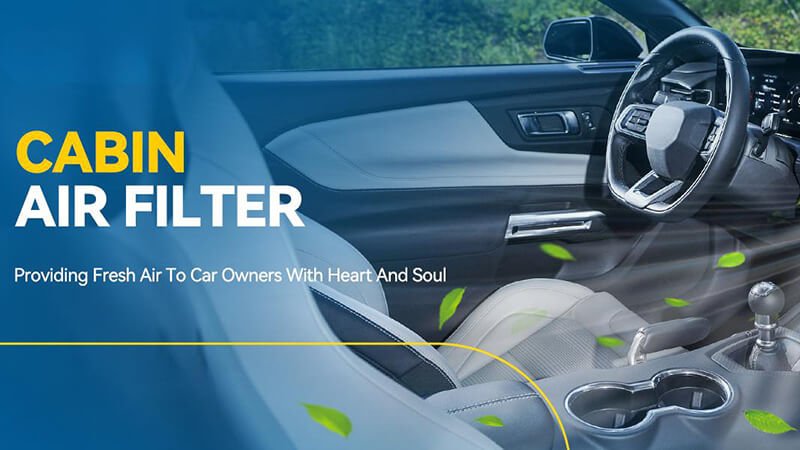Buying car air filters online can be a bit overwhelming, but with the right knowledge, it can be a straightforward process. In this guide, we will walk you through everything you need to know before making your purchase to ensure your vehicle runs smoothly.
Choosing the right car air filter is crucial for your vehicle’s performance and longevity. Knowing which type of filter, size, and brand is suitable for your car can make a significant difference. This guide answers all your questions about buying car air filters online.
Let’s dive deeper into how to choose the right air filter for your vehicle. Whether you’re looking for an engine air filter or a cabin air filter, understanding the right size and specifications is key to making the best decision.

How do I know what filter my car needs?
When shopping for air filters, it’s essential to know exactly what type of filter your car requires. The wrong filter can lead to poor performance or even damage to your engine. Here's how you can figure out which filter your car needs.
To identify the right air filter, you can consult your car’s manual, search online, or use the part number from your old filter. Online parts retailers often allow you to search by car model, which helps you find the correct filter quickly.
Understanding which air filter your car needs depends on two main factors: your car’s make and model1, and the type of driving you do2.
1. Consult Your Car's Manual
The easiest way to identify the correct air filter is by checking your car’s owner manual. The manual provides specific details about the type and size of air filter required. If you no longer have the manual, you can usually find a digital version on the manufacturer's website3.
2. Use the Part Number from the Existing Filter
If you are replacing an old filter, you can remove the current filter and check for the part number. This number corresponds directly to a specific filter model designed for your vehicle. You can easily search online using the part number to find the correct replacement.
3. Check with Online Retailers
If you don’t have the manual or the part number, many online retailers have a feature that allows you to search for car air filters by make, model, and year. This ensures that you buy a filter that fits your car perfectly.
4. Filter Types Based on Driving Conditions
Some filters are better suited for specific driving conditions. For instance, if you often drive in dusty areas, a filter designed to trap more particles might be necessary. Similarly, if you frequently drive in urban environments, you may need a filter with improved performance for both air quality and engine efficiency.
| Filter Type | Ideal For | Benefits |
|---|---|---|
| Standard | Urban driving, regular conditions | Good all-around performance, affordable |
| High-Performance | Dusty, off-road, or extreme driving | Better filtration, longer lifespan |
| Cabin Air Filter | Heavy traffic, polluted areas | Improved air quality inside the cabin |
By considering these factors, you can confidently choose a filter that suits your needs.

How can I tell what size air filter I need?
Size is a critical factor when selecting an air filter for your car. A filter that is too large or small will not fit properly, which can lead to air flow issues. Here's how you can determine the right size.
To find the right size air filter, measure the dimensions of your current filter, or use your car’s model specifications4. Many online retailers allow you to enter your vehicle’s details, ensuring you get the correct size every time.
The size of your air filter is critical for maintaining proper air flow into your engine. If your filter doesn’t fit, it can compromise your car’s performance. Here’s how to make sure you get the right size:
1. Measure Your Existing Air Filter
If you’re replacing the air filter, measuring the dimensions of your current filter is the most accurate method to determine the size. The key dimensions to measure are the length, width, and height5. You’ll want to use a ruler or measuring tape to ensure accuracy.
| Dimension | Description | How to Measure |
|---|---|---|
| Length | The longest side of the filter | Measure from one end to the other |
| Width | The shorter side of the filter | Measure across the filter's width |
| Height | The depth or thickness of the filter | Measure from the front to the back |
2. Check the Part Number
As mentioned earlier, the part number on your old air filter is a great way to identify its size. You can search for the part number online or ask an auto parts retailer to cross-reference it for you.
3. Consult Vehicle Specifications
Another way to determine the size of your air filter is by consulting your car’s specifications. These are typically available in the owner’s manual or can be found on the manufacturer's website. Some online retailers also offer filter size lookup tools where you can input your vehicle details.
4. Choose a Trusted Retailer
When purchasing online, always buy from reputable retailers. They typically provide a filter size chart based on car make, model, and year, reducing the risk of choosing the wrong size. Additionally, they often allow you to return or exchange the filter if it doesn’t fit.
By following these steps, you’ll ensure that your new filter fits properly, keeping your car running smoothly.

What is the difference between an engine air filter and a cabin air filter?
Many people confuse engine air filters6 with cabin air filters7, but these two types of filters serve completely different purposes. Let’s break down the differences between the two and why each is important.
The engine air filter prevents dirt and debris from entering the engine, while the cabin air filter cleans the air inside the vehicle's cabin. Both are crucial for vehicle performance and your health. Knowing the difference helps you maintain both effectively.
Understanding the differences between engine air filters and cabin air filters is essential for vehicle maintenance. Let’s look at both types of filters in more detail:
1. Engine Air Filters
The engine air filter is responsible for filtering the air that enters your engine for combustion. It helps ensure that the engine receives clean air, which is vital for maintaining engine performance and fuel efficiency. The filter traps dust, debris, and other particles, preventing them from entering the engine and causing damage.
| Filter Feature | Engine Air Filter |
|---|---|
| Function | Filters air entering the engine for combustion |
| Common Materials | Paper, cotton, or synthetic fabric |
| Maintenance | Replace every 12,000 to 15,000 miles or as per manufacturer’s recommendations |
| Cost | Typically ranges from $10 to $30 depending on vehicle make |
If the engine air filter becomes clogged, it can reduce engine performance, lower fuel efficiency, and even cause engine damage. Regular replacement of the engine air filter is necessary to keep the engine running smoothly.
2. Cabin Air Filters
The cabin air filter, on the other hand, filters the air inside your vehicle’s cabin, ensuring the air you breathe while driving is clean. This filter traps pollen, dust, and other airborne particles, making the driving experience more comfortable, especially for those with allergies or respiratory conditions.
| Filter Feature | Cabin Air Filter |
|---|---|
| Function | Filters air inside the car cabin for cleaner air |
| Common Materials | Activated carbon, paper, or synthetic fibers |
| Maintenance | Replace every 15,000 to 30,000 miles or annually |
| Cost | Usually ranges from $15 to $50 depending on make |
A clogged cabin air filter can lead to poor air quality inside the car, causing unpleasant odors, reduced air circulation, and a decrease in the efficiency of your air conditioning system. Replacing this filter regularly ensures that the air inside your car remains fresh.
3. Importance of Both Filters
Both the engine air filter and the cabin air filter are crucial for your vehicle’s overall performance. While the engine air filter keeps your engine running smoothly, the cabin air filter ensures a comfortable and healthy environment for passengers. It’s important to maintain and replace both filters regularly to keep your car in top condition.

Will changing air filter make car run better?
You might be wondering if changing your car’s air filter will actually improve its performance. The short answer is yes. Here’s how a new air filter can enhance your car’s efficiency.
Changing your air filter can improve your vehicle's engine performance8, fuel efficiency, and reduce emissions. A clean air filter ensures that your engine gets enough clean air, which is essential for optimal performance.
Replacing an old, clogged air filter can have a noticeable impact on your car's performance. Here’s how a new air filter can improve your vehicle:
1. Improved Engine Efficiency
When your engine gets a steady supply of clean air, it runs more efficiently. The air filter prevents dirt and debris from entering the engine, which could otherwise affect its performance. A clean air filter allows for better combustion, which results in smoother engine operation and more power.
| Benefit | Impact on Vehicle Performance |
|---|---|
| Clean Air Supply | Ensures efficient combustion |
| Engine Operation | Smoother, more responsive |
| Power Output | Improved acceleration |
2. Better Fuel Efficiency
A clogged air filter can restrict air flow to the engine, making it harder for the engine to burn fuel efficiently. As a result, your vehicle may consume more fuel to generate the same amount of power. Replacing a dirty air filter can restore proper airflow, improving fuel efficiency and saving you money on gas.
3. Reduced Emissions
A dirty air filter can also cause your car to produce higher levels of emissions. This is because the engine isn't getting the necessary amount of clean air to burn the fuel effectively. By replacing the air filter, you can help reduce your vehicle's emissions and contribute to a cleaner environment.
4. Prolonged Engine Life
Finally, keeping the engine air filter clean can help prolong the life of your engine. A dirty air filter can cause contaminants to enter the engine, leading to premature wear and tear. Regularly replacing the filter helps protect the engine and ensures it lasts longer.
Conclusion
Changing your air filter can improve engine performance, fuel efficiency, and reduce harmful emissions. By replacing the air filter regularly, you’re taking a simple step to keep your car running at its best.

Conclusion
In conclusion, buying the right air filter for your vehicle is essential for maintaining both its performance and your health. Whether you need an engine air filter or a cabin air filter, knowing how to choose the right type and size will ensure that your car runs smoothly. Don't underestimate the importance of changing your air filter regularly – it can improve fuel efficiency, reduce emissions, and prolong the life of your engine.
We are a very professional OEM Manufacturing on Cabin Air Filter, do not hesitate to get your solutions9.
-
Explains how your vehicle's make and model determine the correct air filter. ↩
-
Understand how different driving conditions influence air filter choices. ↩
-
Helps you locate a digital version of your car's manual for quick reference. ↩
-
Explains how vehicle specifications guide air filter size selection. ↩
-
Provides details on which measurements are critical for finding the right filter size. ↩
-
Provides insight into how the engine air filter impacts engine performance and fuel efficiency. ↩
-
Explains how a cabin air filter improves air quality and health inside the car. ↩
-
Explains how a clean air filter optimizes engine performance and enhances combustion. ↩
-
Learn more details about cabin filter from Runex. ↩













